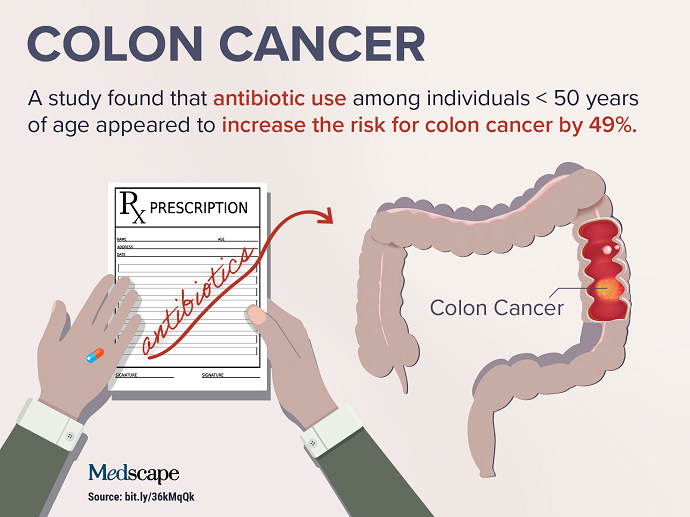Trending Clinical Topic: Colon Cancer
No Results
No Results
Each week, we identify one top search term, speculate about what caused its popularity, and provide an infographic on a related condition. If you have thoughts about what’s trending and why, share them with us on Twitter or Facebook.
A study suggesting a potentially concerning risk factor, as well as new insights into screening timing and efficacy, resulted in this week’s top trending clinical topic. Findings presented at the European Society for Medical Oncology (ESMO) World Congress on Gastrointestinal Cancer 2021 indicated that exposure to antibiotics may be associated with the development of colon (but not rectal) cancer (see Infographic below). The nested case-control study used primary care data from Scotland, including almost 8000 cases of colorectal cancer (CRC) and over 30,000 healthy controls. Any antibiotic use was associated with an adjusted odds ratio of colon cancer of 1.49 (P = .018) in patients younger than 50 years compared with 1.09 (P = .029) in those aged 50 years and older.
Commenting for ESMO, Alberto Sobrero, MD, PhD, said that it is too early to conclude that antibiotics are a causative factor, stating, “We need to understand more about the possible role of the microbiome in bowel cancer before we consider the impact of antibiotics on the intestinal flora.” He reiterated that the findings are a reminder that “antibiotics should not be given unless they are really needed, and we cannot exclude the possibility that unnecessary use of antibiotics may be exposing people to an increased risk of cancer.”
A better-known risk factor in the development of CRC, the consumption of red meat, is now even better understood. A new study potentially identified the mechanistic link associated with the increased risk. Researchers identified an alkylating mutational signature that indicates DNA damage in normal and cancerous colon tissue. This mutational signature significantly correlated with high red meat consumption prior to CRC diagnosis but not with increased intake of poultry or fish or with other lifestyle aspects. Further, patients with tumors that had the highest levels of alkylating damage had a 47% greater risk of dying of CRC than patients with lower levels.
In terms of screening, a new study found that more than one quarter of colonoscopies in Americans aged 30 to 49 years reveal some type of neoplasm. Just over 6% of these patients have advanced cancer. In total, the dataset reviewed contained 3 million colonoscopies; 146,000 were performed on patients aged 18 to 44 years, and 80,000 were performed on patients aged 45 to 49 years. Experts say that these results help justify lowering the new screening age to 45 years.
In regard to early identification, a new study found that patients diagnosed with primary CRC when younger than 50 years have better survival outcomes than individuals diagnosed at 51-55 years. The data included more than 750,000 patients and reiterated the value in catching CRC in younger patients. Initial comparisons across study groups revealed several significant differences. Individuals in the early-onset group were more often women (47.3% vs 43.8%), members of races in the “other” category (6.9% vs 5.9%), and Medicaid patients (12.3% vs 10.3%). They were also more likely to be diagnosed with stage IV cancer (27.8% vs 24.1%) and have rectal tumors (29.3% vs 28.7%).
As opposed to the invasive nature of a colonoscopy, a simple blood test holds promise as a means to screen for CRC. The new test, known as LUNAR-2, is an assay that measures circulating tumor DNA and is carried out on a simple blood draw. It can detect early-stage CRC with high accuracy, say researchers who reported results at the recent annual meeting of the American Society of Clinical Oncology. In a study of 434 patients who were newly diagnosed with CRC, the blood test had an overall sensitivity for CRC of 91% and a specificity of 94%.
When it comes to stopping screening, clinicians more often use a strict age cutoff for CRC than they do for breast and prostate cancer screening. Whether to continue screening and how to make that decision are “not necessarily consistent between clinicians or…cancer types,” study author Justine P. Enns, a researcher at Johns Hopkins University, Baltimore, Maryland, said at the American Geriatrics Society (AGS) 2021 Annual Scientific Meeting. “Interventions to reduce overscreening need to acknowledge that clinicians do not think about cancer screenings homogeneously, and more…guidance is warranted to help clinicians make these complex decisions more systematically,” she said.
From risk factors to screening, new information designed to help prevent and detect CRC resulted in this week’s top trending clinical topic.
Read more clinical information on CRC.
Medscape © 2021 WebMD, LLC
Any views expressed above are the author’s own and do not necessarily reflect the views of WebMD or Medscape.
Cite this: Ryan Syrek. Trending Clinical Topic: Colon Cancer – Medscape – Jul 16, 2021.
Senior Editor, Medical Students, Medscape Drugs & Diseases
Disclosure: Ryan Syrek has disclosed no relevant financial relationships.
You have already selected for My Alerts
Click the topic below to receive emails when new articles are available.
You’ve successfully added to your alerts. You will receive email when new content is published.
processing….
Trending Clinical Topic: Colon Cancer
Research & References of Trending Clinical Topic: Colon Cancer|A&C Accounting And Tax Services
Source

0 Comments